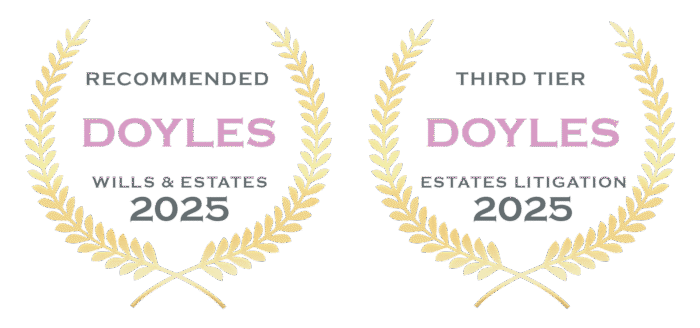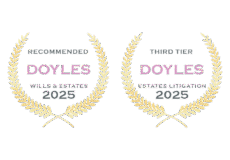We follow a 6 step process when contesting wills and challenging wills. Our process ensures we have the best chance at achieving a favourable outcome for all of our clients, and we’ve proven capable of doing this time and time again.
The Steps
1. Contact us: call, email, or complete our online questionnaire
Looking to contest a will or challenge a will?
We understand that the first step is always the hardest. Contesting a will or challenging a will can often be a very emotional and stressful process for everyone involved. We’ve helped thousands of clients just like you overcome this hurdle and move on with their life by doing our best to take the stress of organising legalities out of the equation, to give our clients the time they need to focus on dealing with the loss of a family member.
We’d like the opportunity to help you and in doing so, would ensure that our hard work, knowledge and experience will achieve the best possible outcome for you and your family.
To take the first step, give our Contested Wills & Estates team a call, send us a message, or complete our online questionnaire now.
2. Your free assessment
How will the free assessment take place?
Your free assessment will allow us to better understand your situation so we can determine the best course of action to take. We appreciate that it may be daunting to discuss such a sensitive matter, which is why we give our clients the option of:
- Phone: A free phone call at a time that suits you
- Online: We arrange a time to chat online (Zoom, Microsoft Teams, etc)
- Email: We discuss the situation back and fourth using a series of emails.
- In person: A meeting at our offices (if required)
Please choose the option that you feel most comfortable with.
See Also: What is the free assessment?
What questions will I be asked during my free assessment?
In order to properly assess your situation and potential family provision claim, a member of our Contested Wills & Estates team will usually ask the following questions:
- When did the deceased die? (date of death – time limits)
- Is the deceased estate comprised of assets mostly located in NSW?
- Do you know the approximate value of the estate and the assets within?
- What is your relationship to the deceased? (eligibility)
- What was the nature and duration of your relationship with the deceased?
- Did the deceased leave a will? If so, do you have a copy of the will?
- If there was a will, do you know who the executor is?
- Do you know if probate has been granted? If so, when?
- If there was a will, do you know if you are a beneficiary?
- Have you already received provision? If so, how much?
- Do you know of any other beneficiaries and potential competing claims?
- What is your current financial standing and earning capacity?
If you already have answers to these questions and would like to speed up the process, feel free to prepare them in advance of the free assessment.
3. You have a good claim? Tell the executor/s
What happens next when I contest a will or challenge a will?
After your free assessment we will need to determine if you have a good claim. A good ‘will dispute‘ claim is one that we believe has a very high probability of success. If we determine that you do not have a good family provision claim we will advise on the reasons why (in plain English) and will offer alternative avenues for you to pursue (if there are any available).
What constitutes a good claim in a will contest?
Every claim is different and needs to be properly assessed by an experienced solicitor. The following is meant to be a guideline only:
- Eligibility – Are you the spouse or a natural born child? Were you a member of the household? Anyone who was dependent on the deceased for a period of time could be eligible.
- Need – Do you have financial need? You need to be able to demonstrate to the court that you have a need.
- Relationship – How was your relationship with the deceased? Was it good or bad? Were you estranged?
- Competing needs – What are the competing needs of the other beneficiaries? Do their needs outweigh your own?
- Size of the estate – What is the size of the estate? If the estate of the deceased is limited, it may not be worth contesting the will.
If we believe you have a good claim and you wish to proceed we will need to contact the executor(s). This contact is necessary to notify them of your claim.
Once the executors have been notified, it’s not uncommon for the claim to be resolved at this early stage, depending on the strength of the claim.
4. Make offers: Document creation
When do we actually start contesting or challenging the will?
At this stage of the will dispute process we will usually begin preparing your evidence by creating a series of documents. Once the evidence has been collated and we have a complete understanding of the situation and accurate knowledge pertaining to the size of the deceased’s estate, we will make an offer to the other parties involved.
Our experience and knowledge in contested will cases means we prepare evidence and make offers in a way that is designed to try and get the matter resolved at this stage of the process, to avoid going to court. This saves a lot of stress, time and money for all parties involved.
5. Initiate proceedings: Go to court
Will I need to go to court if I contest a will?
In the majority of contested will cases there is no need to go to court because the matter is typically resolved during Step 4. This is because the court requires the parties involved to attempt to settle their will dispute before going to court.
However, there are some cases where going to court is unfortunately unavoidable. In these situations it helps to have an experienced legal team behind you who has successfully resolved similar cases before.
This step involves us lodging documents and going to court to notify them of your family provision claim. You do not need to attend Court during this process, however you may choose to do so. We typically lodge these documents for you and act on your behalf.
6. Resolution: The 3 ways to resolve
Once you initiate proceedings your claim will be resolved by agreement, mediation or hearing.
1. Agreement
Agreement is where you and the other side resolve your claim by making offers. We act for you to try and broker a deal with the other side. For example, the executor might offer you $200,000 to give up your claim.
If you accept such an offer then a contract is drawn up so that you can receive any amounts you have accepted. This means that you can get your entitlement without needing to go to court.
2. Mediation
If you are contesting a will, mediation is compulsory. Mediation is where a neutral person (the mediator) works with us and the other party to help us reach a solution.
As your legal professional it is our role to provide you with advice about the mediation process and provide legal advice during the mediation. We also accompany you and may speak for you during this process.
If you and the other party reach a resolution at mediation you will not need to go to court. In our experience approximately 90% of all contesting wills cases settle either at or before mediation.
See Also: Mediation
3. Court hearing
You only need to go to court as a last resort when you are contesting a will or challenging a will.
If your claim does not settle at mediation you will need to have a hearing. At the hearing it is our role, as your legal professionals, to present evidence for you and run your case. The other party will do the same.
At a court hearing the Judge will listen to your will dispute case and the other side’s case. The Judge will make a decision as to how much you should get from the estate.

Turnbull Hill Lawyers, and specifically Adrian Corbould, have been named in the prestigious 2025 Doyles Guide. Both have been listed in the guide since 2018.











 Liability limited by a scheme approved under Professional Standards Legislation
Liability limited by a scheme approved under Professional Standards Legislation